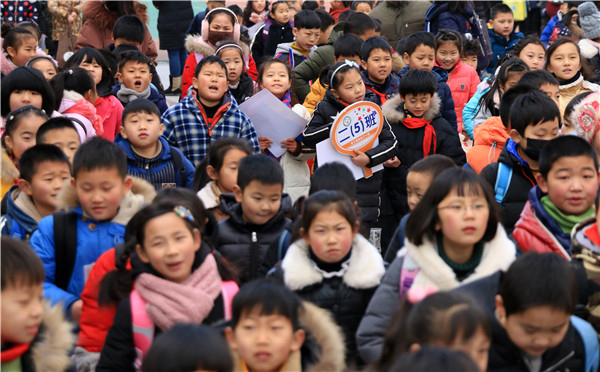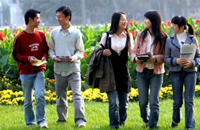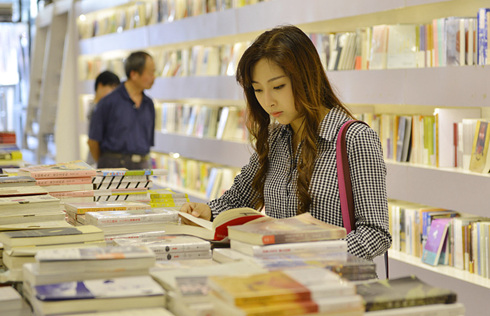New rules bring extracurricular classes to book
In recent years, the bulging, overweight school bags of China's primary and middle school students in urban areas have been increasingly carried by their grandparents or on trolleys.
 |
|
Primary-level students from Yancheng, Jiangsu province, prepare to leave school for the winter holiday. [Photo by ZHOU GUKAI/FOR CHINA DAILY] |
In addition to the two-hour extracurricular classes many students attend when school ends at 3:30 pm on week days and at weekends, the winter and summer vacations have become a third semester for overworked children.
The problem has become so acute that the Ministry of Education has ordered schools to reduce the amount of homework given to students during the period of compulsory education, which lasts from first to ninth grade.
The move is intended to guarantee that primary school students get 10 hours of sleep a night, while middle school students should get nine hours, as relief from after-school training programs that are making their lives more stressful.
In 2016, more than 137 million primary and secondary school students attended extracurricular classes, which had a combined market value of more than 800 billion yuan ($127 billion), according to the Chinese Society of Education, which is overseen by the Ministry of Education.
A different study by the China National Children's Center found that 48 percent of students attend after-school classes, and more than half said they rarely have time to play with friends.
More than 90 percent of the 8,847 children surveyed said most conversations they have with their parents are about academic performance, while 14 percent said they had never spoken with their next-door neighbors.
Experts said that instead of blaming parents and providers of extracurricular classes for the situation, only a thorough overhaul of China's exam-oriented education system would offer a real solution and reduce the burden on students.
Packed schedule
Youyou (not her real name), a 7-year-old girl in Beijing, attended six extracurricular courses during the winter vacation, and since the beginning of the new semester, the first-grader has continued with her busy schedule.
She attends the extra classes-English, math, dancing, piano, drawing and gymnastics-after school and at weekends.
"I know my daughter is under a lot of pressure, but I don't know what to do. There are just too many after-school classes and everyone is signing up," said Wang Lijuan, Youyou's mother, adding that ads for extra classes can be seen everywhere; in the subway, at bus stops and on elevators.
"I can't help but think that I would somehow be failing my daughter if I did not send her to the classes."
Even though Youyou has only just started school, Wang does not want her to get left-behind, face ridicule from other students or lose interest in her studies.
Extracurricular classes are not cheap. They usually cost about 200 yuan an hour, although some one-on-one "interest classes"-such as learning piano or dancing-can cost as much as 1,000 yuan per hour.
Wang estimated that she spends more than 100,000 yuan a year on Youyou's extra classes, which began three years ago when the girl first attended kindergarten.
"My husband and I do not make a lot of money, but we spare no effort or expense on promoting our child's education," she said.
Although there is heated debate about the effect of extracurricular classes, there is no doubt that their growing popularity is generating huge revenue for providers.
For example, in the first nine months of last year, the profits of TAL Education Group rose by almost 55 percent year-on-year to about $140 million.
The rise came as the number of students attending TAL's classes surged to about 5 million, a rise of more than 86 percent from the same period in 2016, according to reports in Southern Weekly.
Unbalanced resources
Yu Minhong, president of New Oriental Education & Technology Group, a leading provider of after-school tutoring services, said the growing academic burden comes from the intense competition between parents to enroll their children in the best middle and high schools.
"Private training institutions should not be blamed, because they are an important supplement to the education system," he said, adding that the academic burden is a neutral concept, and learning comes with pressure-the key is ensuring that the pressure is moderate.
"Nurturing a child is like planting a tree. Although a large amount of fertilizer can make the tree grow quickly, it will grow morbidly later, just like lots of 'young geniuses' in China who turn out to be ordinary when they grow up," he said.
The government has long pushed for the elimination of enrollment tests, from kindergarten to primary school and from primary school to secondary school. Although the practice has been outlawed in some cities since 2013, the exams still exist covertly, but no school principals have been punished for implementing them, according to Yu.
"If the principals of the top 10 middle schools in Beijing were stripped of their posts, people would not dare to organize such tests in the future," he said.
Yang Dongping, dean of the 21st Century Education Research Institute in Beijing, shared Yu's opinion.
He said one cause of the growing burden on students is the unbalanced distribution of educational resources from preschool to university. Meanwhile, almost every district has "super schools" which have the best educational resources and are supported and promoted by local authorities looking to boost their achievements.
According to Yang, shortening the school day, as suggested by some experts, would not reduce the students' workload because providers of private classes would move in to fill the gap. Instead, the exam-oriented education system should be amended to correct the situation.
"It's ironic that the education authorities ask parents to focus less on their children's academic scores, but continue to admit students to high schools and colleges on the basis of scores in entry exams," said Yu, who urged the end of the outdated evaluation system, which is based on test scores and university enrollment rates.
Ma Jingling, principal of Beijing No 4 Middle School, stressed the need for reform of the enrollment system to reduce students' burden.
Even if the test-oriented system continues, education authorities should amend the exam format and make texts easier to understand, which would send a message to students they cannot achieve high scores simply through repetitive training and rote learning.
"Improving students' learning efficiency is essential to reducing their educational burden, and that will require competent, caring teachers and loving parents," he said.
Compulsory education should offer students basic knowledge and learning methods, and their talents and personalities should be nurtured and praised, he added.
Reducing workloads
Recently, both the central and local governments have issued regulations aimed at reducing students' workloads.
Last month, the Ministry of Education and three other ministries jointly issued a guideline to regulate providers of after-school classes.
"Teachers who lure or coerce students to attend extra classes will be dealt with severely or even stripped of their teaching credentials," the statement said.
It added that institutions should not teach anything outside the national syllabus, and they should submit their course plans, enrollment targets and class hours to local education authorities for approval.
Before July next year, the Ministry of Education will establish a public blacklist of after-school institutions that have safety problems, lack permits or have engaged in misconduct.
Moreover, this month, the Education Bureau in Hangzhou, Zhejiang province, issued new guidelines for schools that prioritized children's sleeping hours over academic work.
In two districts of the city, the guidelines limit the amount of time children are expected to devote to homework. Primary school students do not have to complete homework assignments if they have not finished by 9 pm, while the cutoff point is 10 pm for middle schoolers.
"The government will spare no effort to resolve the heavy workloads of primary and secondary school students," Premier Li Keqiang said on March 5, when he delivered the Government Work Report at the first session of the 13th National People's Congress.
Wang Guoqing, spokesman for the first session of the 13th National Committee of the Chinese People's Political Consultative Conference, told a news briefing that the government will continue education reform, reduce the importance of tests and promote education that fosters overall development.
The government will also strengthen regulation of after-school classes to ensure they do not assign additional homework or place extra pressure on students and parents, he said.
In his view, reducing the burden on primary and secondary pupils is a challenge that will require concerted efforts from all sides.
"It is an essential task that will allow children to study happily and grow in a healthy way," he said.


















